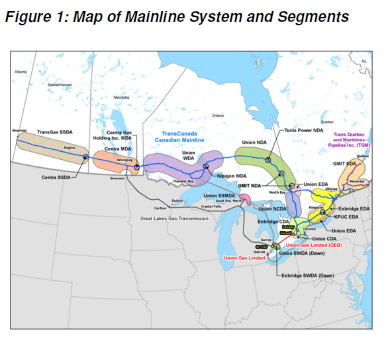Toll and Tariffs – Natural Gas – TransCanada Mainline System – NEB Denies Amendment Application
On February 18, 2016 TransCanada PipeLines Limited (“TCPL”) submitted an application (the “Application”) to the NEB requesting approval of proposed amendments to its tariff respecting the Canadian Mainline Gas Transportation System (the “Mainline System”).
Specifically, TCPL requested the NEB approve its proposed amendments to the tariff in respect of Storage Transportation Service (“STS”), the elimination of Storage Transportation Service-Linked (“STS-L”), and the implementation of a proposed shipper election process.
The NEB denied TCPL’s application for the reasons summarized below.
Mainline Tariff Background
The NEB provided a summary of significant changes and developments to the Mainline System tariff over the past five years.
In the RH-003-2011 Decision, the NEB granted TCPL tools to better manage its system and respond to toll increases and the eroding competitiveness of the Mainline System.
In the period following the RH-003-2011 proceeding, extensive litigation and a need for capital investment resulted in the 2013-2030 Settlement Agreement (the “Mainline Settlement”).The NEB approved the Mainline Settlement in the RH-001-2014 Decision (the “2014 Mainline Settlement Decision”), which further restructured the Mainline and included an update to Mainline tolls for the 2018 to 2020 period. Among other things, the 2014 Mainline Settlement Decision approved the following:
• the proposed revenue requirements and rate base components for the 2015 to 2020 period, subject to a review of forecast assumptions for the 2018 to 2020 period;
• the proposed incentive sharing mechanism that has both upside and downside risk for the Mainline on a year-to-year basis, and includes a contribution from TransCanada;
• Segmentation of the Mainline in principle post-2020, such that the Eastern Triangle will be separate from the Northern Ontario Line and the Prairies Line.
The NEB noted segmentation of the Mainline post- 2020 “as being on the horizon.” That segmentation will involve its own challenges as stakeholders confront a comprehensive change to toll design. Further developments on the Mainline may also materialize as TransCanada continues to innovate and respond to new challenges and opportunities.
Parties’ Submissions
Centra Gas Manitoba Inc., Enbridge Gas Distribution Inc., and Union Gas Limited opposed the Application, while Société en commandite Gaz Métro (Gaz Métro) did not. However, the NEB generally heard from interveners that the Application was premature and that STS should instead be reviewed comprehensively during the Mainline tolls and tariff proceeding for the post-2020 period.
TCPL submitted that the proposed changes were intended to modernize and standardize STS, improve alignment between cost causation and cost responsibility, and improve equity amongst all shippers.
NEB Decision and Reasons
The NEB held that as a result of the Mainline Settlement, shippers expected a reasonable level of toll certainty and stability for the applicable period. One such expectation, was that shippers that made Long- Haul Firm Transportation commitments would not face significant changes to or increased costs for the provision of STS.
Further, given the upcoming matter of Mainline segmentation, the NEB held that it would be unfair and inequitable to STS shippers to impose significant adjustments to their gas transportation portfolios, or to impose significant costs and reductions to flexibility that likely cannot be mitigated.
The NEB therefore denied TCPL’s application to amend the Mainline System tariff and eliminate STS-L.




